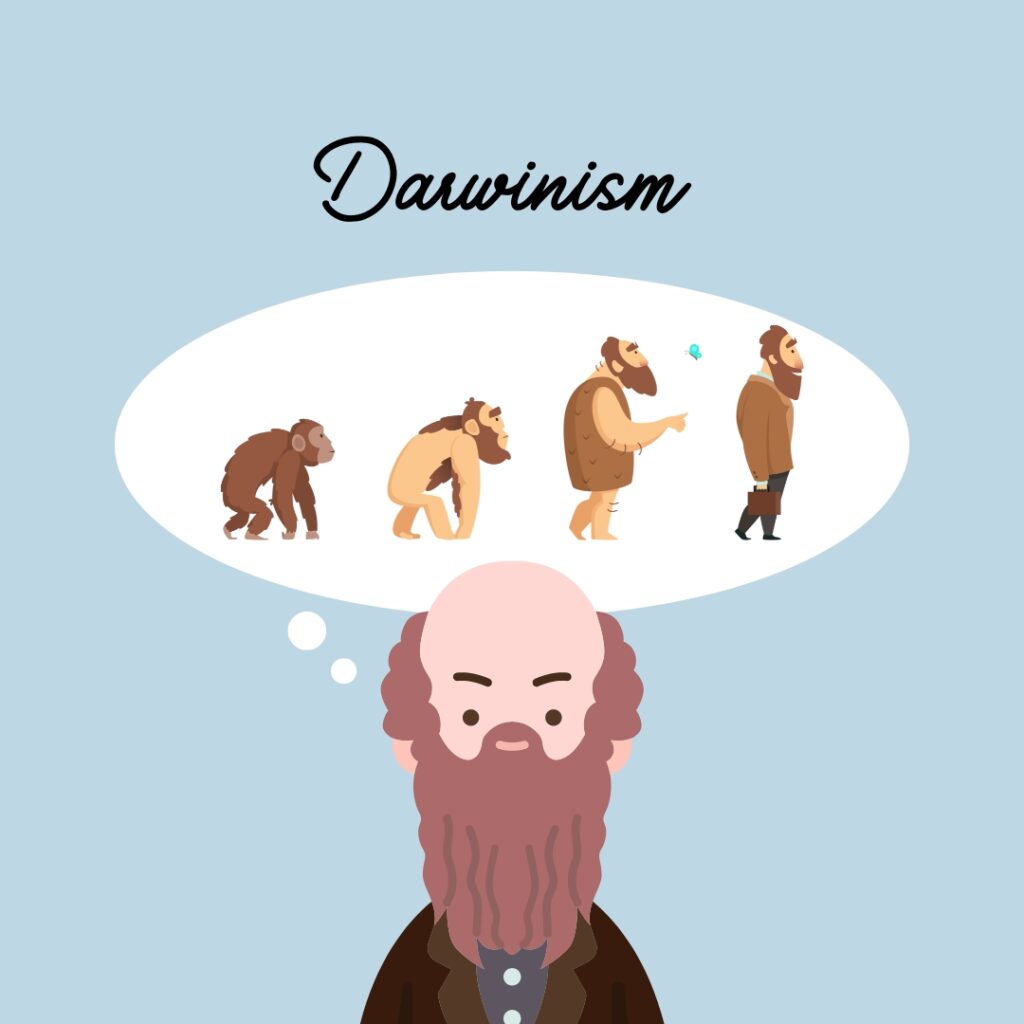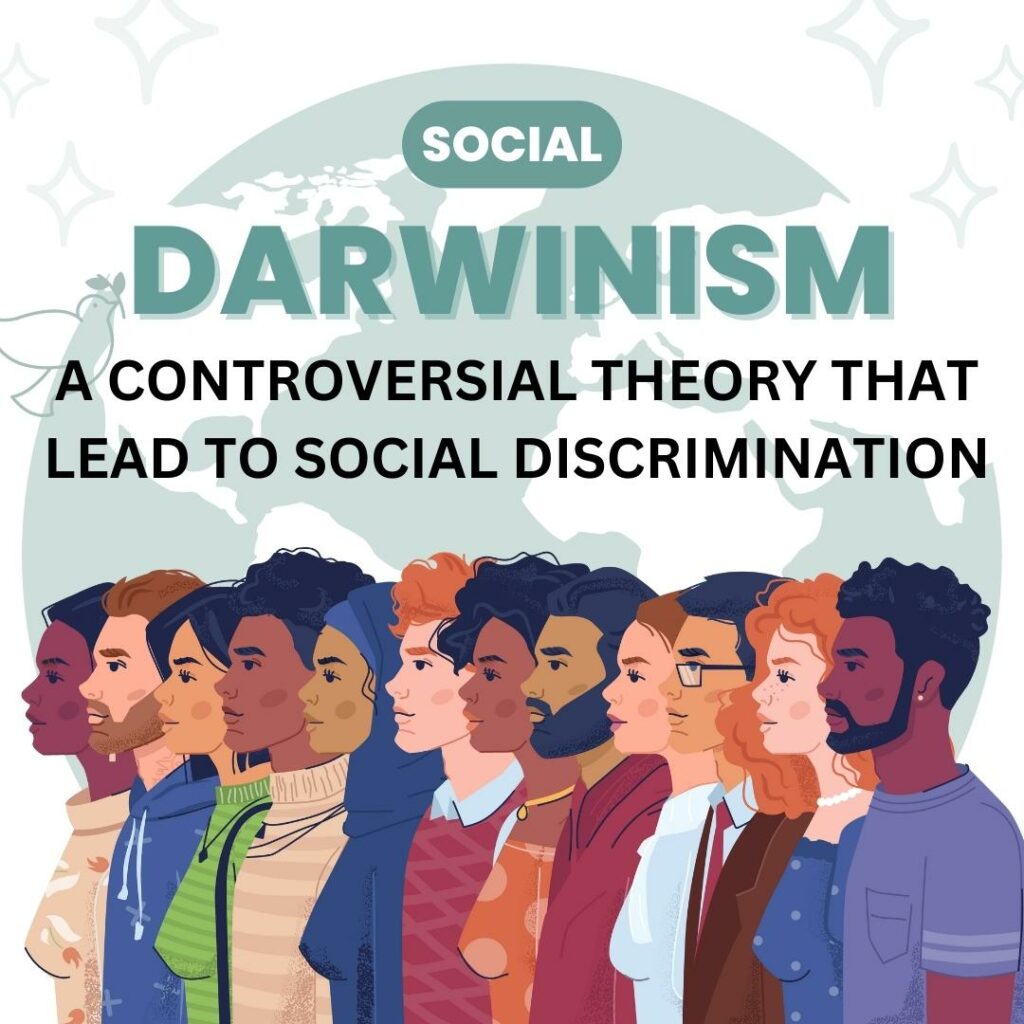Social Darwinism is a theory that emerged in the 19th century and sought to apply the principles of Darwinism to human societies. This theory posits that certain groups of people are inherently superior to others and that society should be structured to reward the strongest and most successful individuals. While Social Darwinism is often associated with individuals such as Herbert Spencer and Andrew Carnegie, its influence can still be felt in modern society. In this article, we’ll explore the history and impacts of Social Darwinism, as well as its continuing relevance today.
Social Darwinism in a Sentence
Social Darwinism is the belief that the human species evolves through competition and natural selection in a way that justifies certain social and political policies.
Explanation of Darwin’s theory of evolution

Before we ponder the idea of Social Darwinism, it is prudent to understand Darwinism as a concept
Darwin’s theory of evolution is based on the idea of natural selection, which holds that advantageous traits in a population are more likely to be passed down through generations. This process leads to gradual changes in species over time, as those with advantageous traits are more likely to survive and reproduce.
Darwin’s theory of evolution has several key components, including the following:
- Variation: Within a population, there is variation in traits that can be passed down through generations.
- Heritability: Traits that are advantageous are more likely to be passed down through generations.
- Competition: There is competition for resources, which leads to the selection of those with advantageous traits.
- Natural selection: Those with advantageous traits are more likely to survive and reproduce, leading to gradual changes in the species over time.
What is the theory of Darwinism?
At its core, Darwinism is the theory of evolution proposed by Charles Darwin. This theory posits that species change and adapt over time in response to their environment and that natural selection is the mechanism through which these changes occur. According to Darwin, the organisms that are best suited to their environment will be more likely to survive and reproduce, passing on their advantageous traits to future generations.
How Darwin’s theory has influenced modern science
Darwin’s theory of evolution has had a profound impact on modern science, influencing fields as diverse as biology, psychology, and anthropology. It has provided a framework for understanding the origins of life and the diversity of species, as well as the mechanisms behind adaptation and evolution.
Darwin’s theory has also been used to study human behavior and culture, providing insights into the evolution of language, social structures, and other aspects of human life. It has even influenced fields such as economics and political science, as researchers have used evolutionary principles to study topics such as cooperation and competition.
Who proved Darwin’s theory?
While Darwin’s theory of evolution was initially met with skepticism by many in the scientific community, it has since been validated by a wealth of evidence. One of the key pieces of evidence for evolution is the fossil record, which shows how species have changed over time. Additionally, advances in genetics and molecular biology have provided further evidence for the theory of evolution.
What is Social Darwinism vs Darwinism?
Before diving into Social Darwinism, it’s important to understand the differences between this theory and the broader concept of Darwinism. At its core, Darwinism is the theory of evolution proposed by Charles Darwin, which posits that species change and adapt over time in response to their environment. This theory is based on natural selection, which means that the organisms that are best suited to their environment will be more likely to survive and reproduce. In contrast, Social Darwinism is an attempt to apply these principles to human societies, with the belief that only the strongest and most successful individuals should be rewarded.
What caused Social Darwinism?

The emergence of Social Darwinism was largely influenced by the social and political context of the 19th century. This was a time of great change, with rapid industrialization and urbanization leading to the growth of cities and the concentration of wealth. Many people believed that this shift represented progress and that those who were successful in this new society were inherently superior to those who were not. Additionally, Social Darwinism was influenced by the ideas of thinkers such as Herbert Spencer, who believed that society could be understood in the same way as the natural world.
What was Social Darwinism called?
Social Darwinism has been referred to by many names over the years, including “survival of the fittest,” “natural selection,” and “eugenics.” Regardless of the terminology used, however, the core idea behind Social Darwinism remains the same: that society should be structured to reward the strongest and most successful individuals.
Why is Social Darwinism important?
The impact of Social Darwinism has been both positive and negative. On the one hand, Social Darwinism has been used to justify advances in science and technology and encourage competition and innovation. On the other hand, Social Darwinism has also been used to justify discrimination and inequality, particularly against marginalized groups. For example, Social Darwinism was used to justify eugenics programs in the early 20th century, which sought to promote the reproduction of “desirable” traits and prevent the reproduction of “undesirable” traits. This led to forced sterilization and other forms of human rights abuses, particularly against people with disabilities and people of color.
Who benefited from Social Darwinism?
The beneficiaries of Social Darwinism were typically those who were already in positions of power and privilege. This included wealthy individuals and members of dominant social groups, who were often able to use Social Darwinism to justify their own success and to maintain their position in society. However, the negative impacts of Social Darwinism have been felt by marginalized groups, including people of color, people with disabilities, and the working class.
Prominent Social Darwinists
The concept of Social Darwinism was contributed by a number of prominent figures in the 19th and early 20th centuries. Here are some of the chief contributors and their contributions:
| Contributor | Contribution | Academic Work | Points of Difference |
| Herbert Spencer | Coined the term “survival of the fittest” to describe the application of Darwin’s theory to society | The Principles of Biology, Social Statics, The Study of Sociology | Believed in the idea of laissez-faire capitalism and minimal government intervention. He believed that competition was necessary for progress and that the strong should be allowed to thrive while the weak should be left to perish. |
| William Graham Sumner | Applied the principles of Social Darwinism to the field of economics and advocated for a laissez-faire capitalist system | Folkways, What Social Classes Owe to Each Other, The Absurd Effort to Make the World Over | Believed that government intervention in the economy was harmful and that the strong should be allowed to succeed and the weak should be allowed to fail. |
| Andrew Carnegie | Believed that Social Darwinism justified the existence of a wealthy upper class and that the wealthy had a responsibility to use their resources for the benefit of society | The Gospel of Wealth, Triumphant Democracy, An American Four-in-Hand in Britain | Advocated for philanthropy and believed that the wealthy had a moral obligation to use their resources to improve society. Believed that a wealthy upper class was necessary for societal progress. |
| Francis Galton | Applied the principles of natural selection to the study of human society and advocated for eugenics | Hereditary Genius, Inquiries into Human Faculty and Its Development, Essays in Eugenics | Advocated for the selective breeding of humans to improve the genetic quality of the population. Believed that certain races and social classes were inherently superior and that they should be encouraged to reproduce. |
| Thomas Malthus | Believed that population growth would inevitably outstrip the food supply and lead to a “struggle for existence” | An Essay on the Principle of Population | Advocated for population control measures such as delayed marriage and celibacy. Believed that the poor should be left to suffer the consequences of their own actions and that government intervention would only exacerbate the problem. |
It is important to note that while these contributors all espoused the principles of Social Darwinism, there were significant differences in their theories and beliefs. Some, like Spencer and Sumner, believed in a laissez-faire capitalist system with minimal government intervention, while others, like Carnegie, believed in using wealth for the betterment of society. Galton’s advocacy for eugenics was also controversial and highly criticized. Malthus’ ideas about population control were similarly controversial and are still debated today. Ultimately, while these figures contributed to the development of Social Darwinism, their theories and beliefs varied widely.
Social Darwinism and Andrew Carnegie
Andrew Carnegie was a prominent figure in the emergence of Social Darwinism in the United States. Carnegie believed that the wealthy had a responsibility to use their resources for the greater good, but also believed that success in society was a reflection of inherent superiority. This led him to promote the idea of the “Gospel of Wealth,” which argued that the wealthy should use their resources to promote social good, but only if they did so in a way that reinforced existing power structures.
Social Darwinism by Herbert Spencer
Herbert Spencer was a prominent English philosopher who believed that society could be understood in the same way as the natural world. Spencer believed that only the strongest and most successful individuals should be rewarded, and that competition was necessary for progress and innovation. His ideas were influential in the development of Social Darwinism and helped to shape the way we think about competition and success in modern society.
What was the greatest impact of Social Darwinism?
The greatest impact of Social Darwinism was its justification of discriminatory practices and policies against marginalized groups. The idea that some races, ethnicities, and individuals were biologically superior to others led to the belief that those deemed inferior were unworthy of social and economic support. This resulted in implementing of discriminatory policies and practices, such as eugenics, segregation, forced sterilization, and genocide.
In the United States, Social Darwinism contributed to the passage of laws that restricted immigration based on racial and ethnic criteria. It also influenced the development of discriminatory practices in housing, employment, and education. The eugenics movement, which aimed to improve the genetic quality of the population by encouraging reproduction among the “fit” and sterilizing the “unfit,” was also heavily influenced by Social Darwinism.
In Europe, Social Darwinism played a significant role in the rise of fascism and the justification of the Holocaust during World War II. The Nazis believed in the superiority of the “Aryan race” and used Social Darwinism to justify the extermination of Jews, Romani people, and other “undesirable” groups.
Overall, the impact of Social Darwinism has been significant and far-reaching. It has perpetuated discrimination and oppression against marginalized groups, and its legacy can still be felt in modern-day society. It serves as a warning of the dangers of using scientific theories to justify discriminatory practices and policies.
Samrat is a Delhi-based MBA from the Indian Institute of Management. He is a Strategy, AI, and Marketing Enthusiast and passionately writes about core and emerging topics in Management studies. Reach out to his LinkedIn for a discussion or follow his Quora Page
